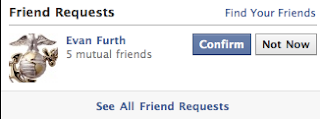An act of trust is both emotional and logical. When one trusts someone they do not feel vulnerable in the sense that their friends will abuse knowledge, such as knowing your password or borrowing something important to you. I surveyed a variety of people asking the following questions:
1) Would you trust anyone to use your cell phone?
2) Do you trust your best friend?
3) How many people do you trust with your facebook password?
4) Do you trust anyone with your computer?
Every person answered "no" to the first question. People feel that some friends would abuse the privilege by make unnecessary calls, inappropriate texts, and other forms of mischief. Results showed that every person felt comfortable telling their best friend any type of personal information. Also, it was the consensus that they would trust them under any circumstance. I gathered from my peers that the average number of people they trust with their Facebook password was three. Many stated that there are not many people that can be trusted, and there’s only a few that will not take advantage of you. The answer to the final question was resounding "no;" none of the survey-takers' peers can be trusted with their computer. According to everyone interviewed, some people do not have the respect for their personal information, in addition, they lack the respect to take care of the computer itself.
So what does trust have to do with social capital? Social capital is about relationships, attitudes, and values you hold with society. From evaluating my peers' answers to these questions, I conclude, that most people do not have a good social capital. This is troubling because being socially connected gives each individual a sense of security.
1) Would you trust anyone to use your cell phone?
2) Do you trust your best friend?
3) How many people do you trust with your facebook password?
4) Do you trust anyone with your computer?
Every person answered "no" to the first question. People feel that some friends would abuse the privilege by make unnecessary calls, inappropriate texts, and other forms of mischief. Results showed that every person felt comfortable telling their best friend any type of personal information. Also, it was the consensus that they would trust them under any circumstance. I gathered from my peers that the average number of people they trust with their Facebook password was three. Many stated that there are not many people that can be trusted, and there’s only a few that will not take advantage of you. The answer to the final question was resounding "no;" none of the survey-takers' peers can be trusted with their computer. According to everyone interviewed, some people do not have the respect for their personal information, in addition, they lack the respect to take care of the computer itself.
So what does trust have to do with social capital? Social capital is about relationships, attitudes, and values you hold with society. From evaluating my peers' answers to these questions, I conclude, that most people do not have a good social capital. This is troubling because being socially connected gives each individual a sense of security.








